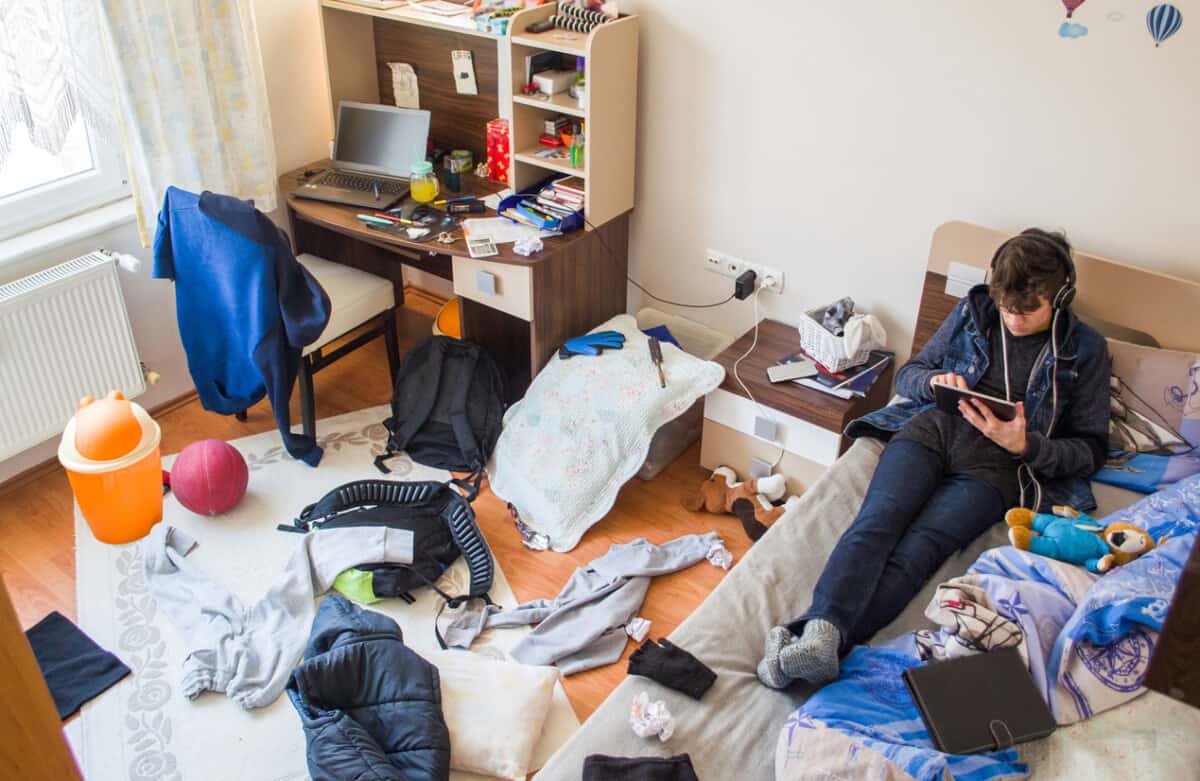It is the stuff of threats, of epic battles and of miserable Saturday mornings for both children and parents. But is all this angst and upset really worth it? Should kids really have to keep their rooms clean?
Here at Alzein Pediatrics, we understand this debate. We talked to a variety of parents about how they were required to keep their rooms as kids, and what expectations and restrictions they now have of their own children.
“Diane” said, “I didn’t have a choice in the decor of my room growing up and the bed had to be made every day and clothes and such had to be put away. If it wasn’t, you came home from school with it all on the front lawn. No posters, pictures or anything on the walls other than what Dad put on it, whether paint or wall paper.
She continued, “Growing up with strict rules on our rooms was rough and, of course, embarrassing when you see your clothes on the front lawn when you are walking home from school with your friends. I personally haven’t made my bed every day since the day I moved out.”
For her own children, Diane said, “I changed my course of action with my kids because I remembered how badly I wanted to hang posters on my walls and have a space to call my own. I didn’t restrict anything they wanted to do to decorate their own rooms. I wanted them to be able to create a space of their own whether messy, clean, posters, drawings, pictures of them and their friends on the walls. “You do you in your space.” Their mess didn’t bother me if I just closed the door. I didn’t want to be as strict as my parents. Whatever brought them peace and individuality. Now as young adults, they get to their own point of where they can’t take the mess and clean it.”
Diane isn’t the only person we spoke to who found her belongings on the front lawn or in the trash. Many adults who experienced this level of expectations and repercussions echoed her sentiments, saying they didn’t feel like their bedrooms were a safe, private space of their own, allowing them to express themselves, either with decor or cleanliness standards. “Jane” said she couldn’t come out of her room until it “passed inspection.”
Universally, these now-parents allow their own children much more freedom.
“Melissa” had a different experience. “I was allowed free rein in my room, as were our sons. My Mom would just close my door if company came over. My parents always treated me as an equal and for that I’m eternally grateful. My room was my personal space to keep messy or clean as I wished. Most of the time I kept it neat, but I rarely made my bed. I couldn’t see the point.”
She continued, “Once, our older son, painted both the door to his room and his room in what can only be described as a fit of wild independence. A few years later, I found him down in our basement, sanding said door. I asked him how he was doing and he said, “I’d be doing a lot better if I hadn’t been such a jerk with this door.” I said, “Well, you were just trying to make a statement.” He replied, “I’d feel a lot better if I could just remember what that statement was!” Melissa says, “I think, if left alone, we all come to our senses.”
Most experts agree that letting a child maintain their own rooms is a healthy strategy. Dr. Alzein says, “We’ve never seen a child get sick from a messy room. Most of the time, wanting a clean room is our own need as parents. When you keep a clean home and involve your child in tidying and cleaning common areas like the family room, kitchen and bathroom, your child will learn – eventually – that living in a clean, organized space is preferable to a messy space. You can, however, make and keep bedroom rules about leaving a clear path in case of fire and dirty dishes being returned to the kitchen within a set amount of time – or you may run out of spoons!”
You can help your child build good habits by having them help with family chores as soon as they are able. Even toddlers can pick up and put away toys in common spaces and bring dirty clothes to the laundry area. Older children can scrape dishes and load them into the dishwasher, vacuum and dust. Establish an evening tidy that removes clutter from common spaces and helps everyone feel organized to begin the next day. Research shows that doing family chores helps children achieve academic success, build better relationships and lowers their risk of drug use.
However, giving your children control over their bedroom space, to have it be their comfort zone, is important for them psychologically. It shows you respect their privacy and choices. Keeping their room as they like is a safe, simple way to help your child show their independence – and for parents to respect that independence. In younger children, cleaning up can also interfere with imaginative play development.
So go ahead and embrace the chaos. And then shut the door.
Do you have questions about your child’s health and development? Just send Alzein Pediatrics a message through your patient portal. We will be happy to help!


